Forty-six seconds was long enough for Angela Carini. Long enough for two right jabs from Imane Khelif, the boxer her friends and family had told her to avoid for a week because “she’s a man,” to find their mark. Long enough for those punches to undo a chin strap, rock her backward, and leave her blue shorts streaked with blood.
Long enough to let her coach know she was done, to drop to her knees in the middle of the ring in protest, to smash the canvas in despair, and to burst into tears. This continued after she had spoken to reporters and walked inconsolably to the locker room.
Hopefully it will also last long enough for the Olympic bosses to think carefully about the mess they themselves have created.
“It hurt so much,” said a distraught Carini, clutching her nose, afterward. “After the second one, I couldn’t breathe. I went to my coach and said ‘enough,’ because it takes maturity and courage to quit. I didn’t want to fight anymore… I’ve never felt such a blow.”
Never in the history of Olympic women’s boxing had a welterweight, 66kg, clash between an Algerian and an Italian generated so much interest. The press box at the North Paris Arena, across the road from Charles De Gaulle airport, was packed with journalists from around the world, straining to get a look.
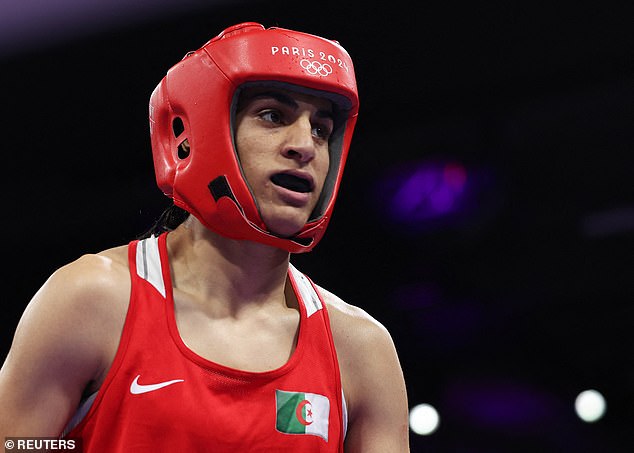
Imane Khelif, one of two boxers involved in an Olympic qualifying row, won her first boxing match of the Games after her opponent withdrew in the opening round on Thursday
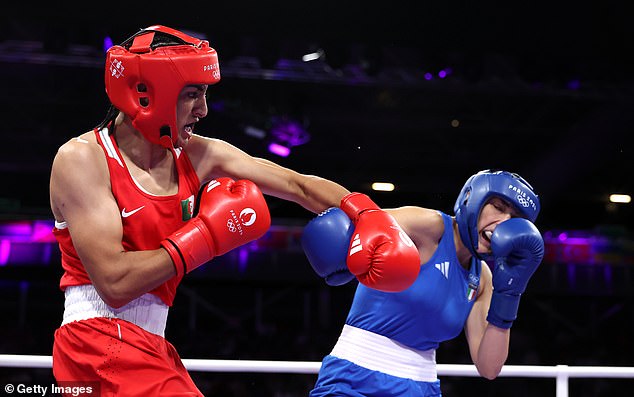

Khelif hit Angela Carini with two hard punches before the match was called
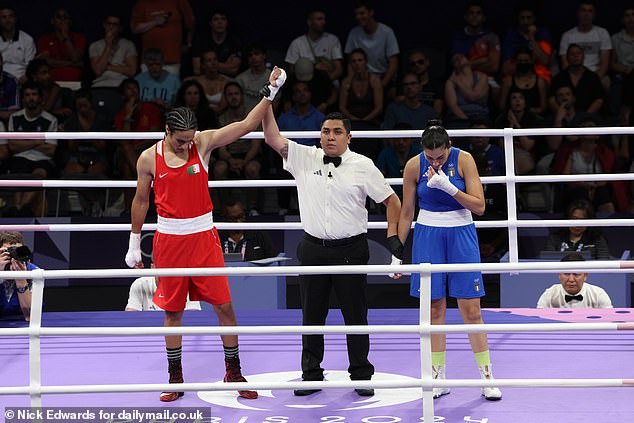

Italian boxer Carini left the match after claiming the Algerian’s punches ‘hurt like hell’
It was a surreal scene. In the lead-up to the match, announcers sang high-octane pop songs to an appreciative audience, most of whom had come to watch others, with this being one of 28 fights on the bill. On the way from the nearby station, Eye of the Tiger, from the aptly named Survivor, was played over a megaphone from a volunteer’s phone.
Khelif, in red and with short black hair, entered first without audible boos from the temporary stands. Two small groups of Algerians waved their green-and-white flags, but the cheers were considerably louder when Carini, the daughter of a policeman, walked to the blue corner amid the cheerful sounds of Volare, which someone had seen fit to play. The Neapolitan had won silver in world and European events. She was no wimp. She kissed a glove, looked up at the roof and made a quick sign of the cross before going into battle. But this was no battle. This was a mismatch from the start.
Khelif dominated the center of the ring and went to work. After feigning a left, the Algerian hit Carini with a right on the chin. After a pause, Carini swung to her corner to fix her head guard and exchanged words with her coach. After the belt was fixed, she tried a jab of her own, which was deflected by her tall opponent who hit her again with another right on the chin, sending her lurching backward. Once again, Carini turned to her corner. “Non e gusto,” she said – “it’s not fair” – and that is the central accusation at the heart of the case.
As Carini knelt in protest, Olympic broadcasters cut sharply to a shot of the Eiffel Tower. This could be a milestone in itself. Khelif had other emotions. “I’m here for the gold – I’m fighting everyone,” the victorious Algerian said. “I’m fighting everyone.”
Khelif and Taiwan’s Lin Yu-Tin, who is also competing in Paris, were disqualified from last year’s women’s world championships, with International Amateur Boxing (IBA) president Umar Kremlev – who officiated at the bout – saying further DNA testing had “proven they had XY chromosomes”. In short, that they were classified as “biologically male”.
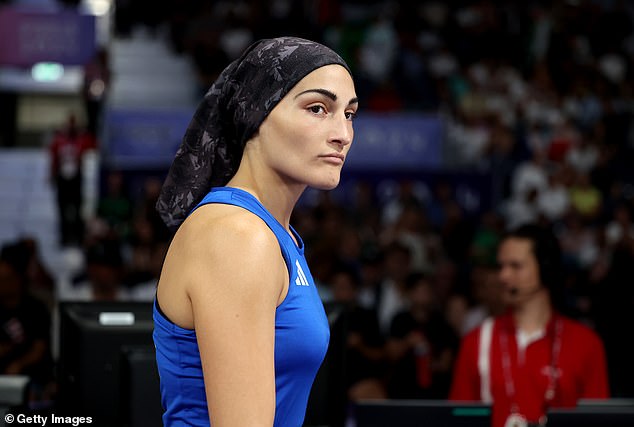

Carini’s coach told the Italian boxer it was ‘too dangerous’ to face Khelif
But after a dispute with the IOC, the IBA was stripped of its authority to host Olympic events and here they are. The IOC rules are considered more lenient. In fact, communications chief Mark Adams had previously warned reporters not to start a “witch hunt” with the seemingly simple explanation that both boxers had “female” on their passports and should therefore be eligible to compete in that category.
Such words might not find favor in Carini’s devastated camp, however gracious they were in a dubious defeat. “I’m not one to judge,” she said. “I stepped into the ring, did my duty as a boxer and tried to fight, regardless of controversy or anything. I wanted to win.”
After saying he didn’t know if her nose was broken, her coach added: ‘I have to talk to the girl. But many people in Italy tried to call her and said: “Please don’t go: it’s a man, it’s dangerous for you”.’
On the eve of the farce, the IBA released a statement clarifying why Khelif and Taiwan’s Lin Yu-Tin had been disqualified from the tournament, which was held in New Delhi.
Reference was made to an “accurate” assessment that was “extremely important and necessary to maintain the level of fairness and integrity of the competition”.
The letter added that no testosterone tests were conducted, but “a separate and recognized test, the details of which remain confidential.” That test “conclusively indicated that both athletes did not meet the required criteria and that they had a competitive advantage over other female competitors.”
The IBA said the ban was also based on tests carried out at the 2022 World Boxing Championships and, significantly, said Khelif had withdrawn an appeal to the Court of Arbitration for Sport, making the decision legally binding.
In a dig at the IOC, they expressed “concerns about the inconsistent application of eligibility criteria by other sporting bodies, including those overseeing the Olympic Games.” “The IOC’s differing rules on these matters raise serious questions about both competitive fairness and athlete safety,” they added. There was little here to suggest those words were inaccurate.
Others had their own opinions before the match. Australian boxing captain Caitlin Parker expressed her fears that one of her teammates would be fighting in the same 66kg weight class as Khelif. “I don’t agree with them being allowed to participate in sports, especially combat sports,” Parker said. “It can be incredibly dangerous.”
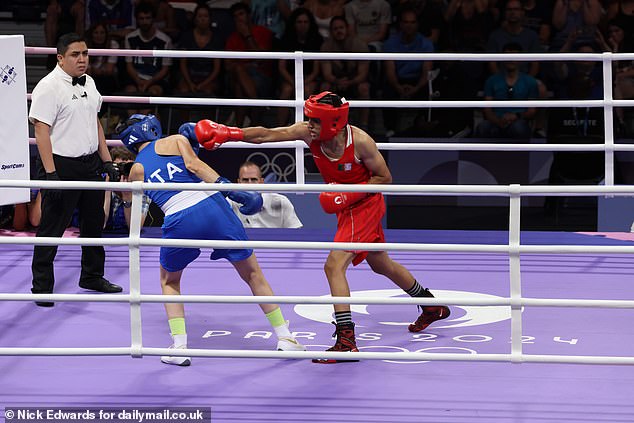

Carini was hit twice in the opening round but was forced to retire after 46 seconds
Italian Sports Minister Andrea Abodi also weighed in. “In an event that represents the highest values of sport, the safety of female and male athletes must be guaranteed, as well as respect for fair competition. That is not how it will be for Angela Carini.”
He was not wrong and the country’s prime minister reacted quickly to the chaos. “The testosterone levels that were present in the Algerian athlete, the match was not a match, it was not equal,” said Giorgia Meloni.
Perhaps even more damaging to the IOC were comments made after the farce by UN official Reem Alsalem. The body’s special rapporteur on violence against women and girls voiced her concerns online, tweeting that Carini “rightly followed her instincts and prioritized her physical safety, but she and other female athletes should not have been subjected to this physical and psychological violence based on their gender.”
Khelif walked through the mixed zone without answering questions from the press. There should be some sympathy too. There are others who need to explain and possibly take action to address one of the darkest episodes in Olympic history.



